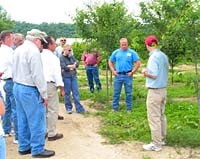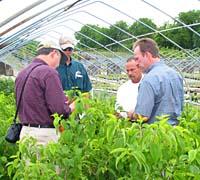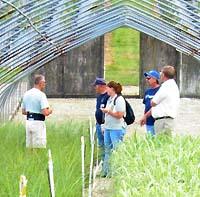Nursery Owners Learn to Outsmart Pests with Integrated Pest Management
Nursery Owners Learn to Outsmart Pests with Integrated Pest Management


 Learning to effectively control pests in nurseries can make plants healthier and more attractive to consumers. To that end, a group of nursery owners and employees recently gathered to learn how to employ Integrated Pest Management techniques.
Learning to effectively control pests in nurseries can make plants healthier and more attractive to consumers. To that end, a group of nursery owners and employees recently gathered to learn how to employ Integrated Pest Management techniques.
“We are hoping to educate growers and nursery employees about different options they have in pest management,” said Amy Fulcher, Extension associate for nursery crops at the University of Kentucky College of Agriculture. “We want to show them various ways of approaching insect, disease and physiological problems from a knowledge-based perspective rather than a spray-solution perspective.”
The group gathered at the Boone County Cooperative Extension office before traveling to Ammon Wholesale Nursery, Inc., the largest nursery in northern Kentucky, and participants were able to see field, container and pot-in-pot production at work. They broke into groups to explore the more than 30 greenhouses on the grounds.
“We’re teaching some very specific principles of IPM and how to employ them in the nursery,” Fulcher said. “We are showing them very specific scouting techniques that they can use to identify problems and then use pest information to find the appropriate treatment.”
Melvin Moffett owns Snow Hill Nursery in Shelbyville. Although late spring and early summer are busy times for him, he values continuing education and chose to attend the program to learn more about how to use IPM in his business.
“It gives us more confidence that we are doing the right thing and that we are spraying at the right time and treating the right pest with the right insecticide when we do have to use them,”
Moffett said. “We’re starting slow and gradually building it up. You need to know all you can about the problems that are potentially there and stay on top of it. If something comes along that will save us a lot of money or a lot of time, we feel like these will be the people (UK Extension professionals) who will tell us.”
 Moffett emphasized that if employing IPM techniques saves him time and money, he will be able to pass the savings along to his customers.
Moffett emphasized that if employing IPM techniques saves him time and money, he will be able to pass the savings along to his customers.
“I think the customers will get a pest-free product and if I don’t lose as many plants, I may not have to raise prices,” he added. “It comes down to economics and marketability.”
Participants also got to listen to experience-based advice from nationally recognized Ornamental Entomologist Joe Boggs from Ohio State University and North Carolina State University Commercial Horticulture Agent Craig Adkins.
“Hopefully IPM is helping all of us by reducing the number of pesticides that are used – especially pesticides that are used in an ineffective or inefficient manner,” Fulcher said. “Hopefully we’re teaching them to refine the timing of pesticide usage so that when they are applied they will be effective. We’re hoping to give growers options of lower-toxicity pesticides and teaching them to just use information like the knowledge of the pest’s life cycle so it can be intercepted at the ideal time. All of those things reduce the costs of the plant and all contribute to the health of a plant. So hopefully the consumer gets a healthier plant that is less expensive.”
The educational day was sponsored by Kentucky Integrated Pest Management and the Kentucky Horticulture Council and hosted by the Boone County Cooperative Extension office.
